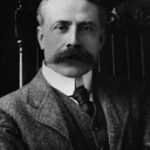Bard Music Festival, Bard SummerScape
18th Annual Bard Music Festival: Edward Elgar and His World
August 10–19, 2007
Bard Music Festival, Bard SummerScape
August 10–19, 2007


“My idea is that there is music in the air, music all around us, the world is full of it, and you simply take as much as you require.” —EDWARD ELGAR
EIGHTEENTH SEASON
The Bard Music Festival
presents
EDWARD
ELGAR
AND HIS WORLD
WEEKEND ONE, AUGUST 10 – 12, 2007
WEEKEND TWO, AUGUST 17 – 19, 2007
WEEKEND THREE, OCTOBER 26 AND 27, 2007
England was never a “Land ohne Musik”—a “country without music,” as continental Europeans liked to quip. Nonetheless, in 1899 Edward Elgar (1857–1934), with his “Enigma” Variations, became the first English composer since Henry Purcell to garner wide international recognition. Yet Elgar emerged out of a longstanding and rich English musical culture, with a widespread secular and sacred choral tradition, public concerts, and domestic amateurism. Despite this remarkable tradition, in the field of musical composition England seemed outclassed by Germany, France, and ultimately Russia. That deficit would be erased by Elgar and his contemporaries, who successfully created a music that served as a medium of modern national self-definition. Elgar’s The Dream of Gerontius, his symphonies, part songs, concertos, choral works, and Pomp and Circumstance marches mirror the ways in which music helped articulate and define religious sentiment, aesthetic ideals, restrained dignity, and the poignant if not unique English pastoral nostalgia in an era when Britain was at its height as a modern world economic and political power.
The Bard Music Festival will explore Elgar’s career and music in the context of musical, societal, cultural, and political developments in England from the era of the Crystal Palace to the interwar years of gramophone recording and radio broadcast. Elgar was well aware of the stunning advances in science and technology in his lifetime; he was himself an enthusiastic amateur chemist with patents to his name.
Elgar’s musical world, just as England’s throughout the 19th and 20th centuries, was hardly exclusively English. In this year’s Bard Music Festival, the influential music of Mendelssohn, Fauré, and Richard Strauss will be heard alongside the works of Elgar’s English precursors, contemporaries, and successors, including William Sterndale Bennett, Hubert Parry, Charles Villiers Stanford, Ethel Smyth, Arthur Sullivan, Frederick Delius, John Ireland, Frank Bridge, Gustav Holst, Herbert Howells, Ralph Vaughan Williams, William Walton, and Arthur Bliss. The 18th volume in the award-winning Bard Festival series published by Princeton University Press will be Elgar and His World, edited by Byron Adams.
This project is made possible in part by grants from the National Endowment of the Arts, the New York State Council on the Arts, the Board of the Bard Music Festival, and the Friends of the Bard Music Festival.
Programs and performers are subject to change. For further information, please visit
fishercenter.bard.edu.